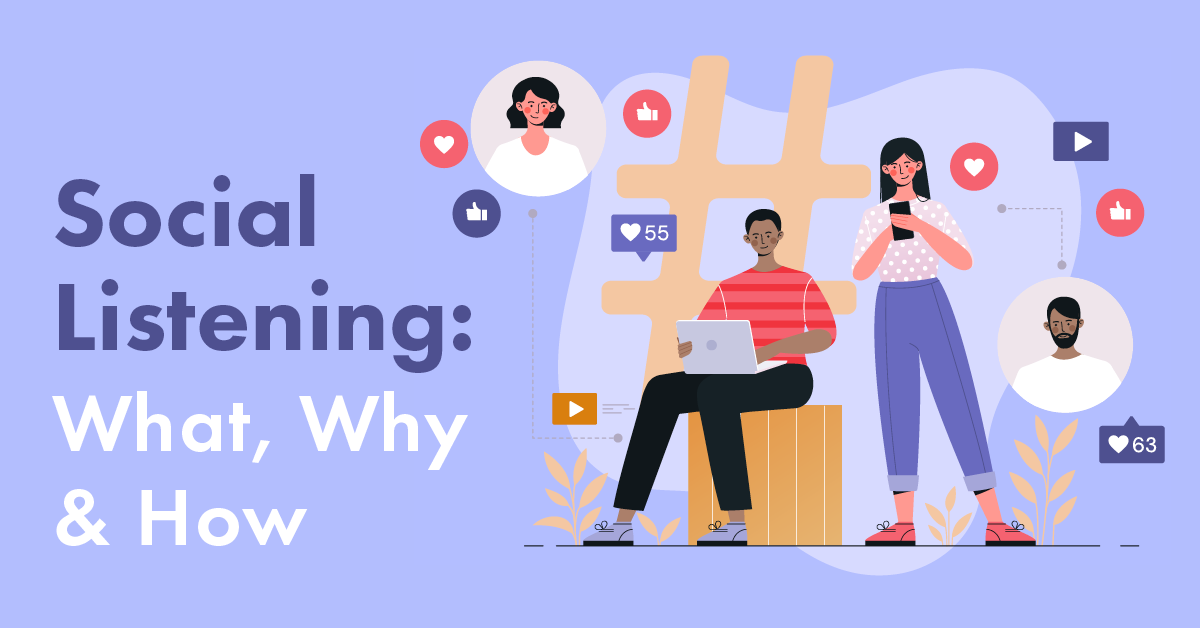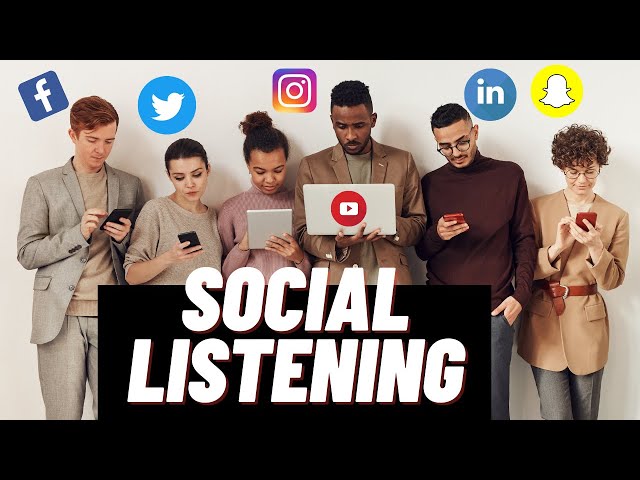In today’s digital age, businesses are not only defined by their products or services but also by how well they understand their customers. Social listening has emerged as a crucial tool for companies to gain valuable insights into consumer sentiments, track brand reputation, and identify emerging market trends. This article explores the world of social listening services, shedding light on its significance and how businesses can effectively utilize it to their advantage.
Social Listening Services: Understanding Customer Insights and Empowering Your Business

Social media platforms have become a hub for billions of users worldwide to share their thoughts, opinions, and experiences. Also, Social listening, also known as social media monitoring, is the process of actively tracking and analyzing these conversations to gather valuable data that can influence business decisions.
What is Social Listening?
Social listening is the practice of monitoring social media platforms, forums, blogs, and other online channels for mentions of a brand, product, or specific keywords. This allows businesses to understand what customers are saying about them, their competitors, and the industry as a whole.
Importance of Social Listening Services
1. Understanding Customer Sentiment
Social listening enables businesses to gauge how their customers feel about their products or services. By analyzing conversations and comments, companies can identify positive feedback, complaints, and suggestions, allowing them to respond effectively and improve their offerings.
2. Monitoring Brand Reputation
Maintaining a positive brand reputation is crucial for any business. Social listening helps organizations keep track of mentions related to their brand, address negative comments promptly, and take necessary actions to protect their image.
3. Identifying Market Trends
Through social listening, businesses can identify emerging trends, topics, and discussions within their industry. This real-time data can be used to make informed decisions, develop new products, and refine marketing strategies.
4. Tracking Competitor Activity
Social listening allows companies to keep an eye on their competitors’ activities and understand how customers perceive them. This information can be leveraged to gain a competitive edge and identify areas for improvement.
How Social Media Listening Works
1. Data Collection
Social listening tools gather data from various sources, including social media platforms, news articles, and online forums. These tools use keywords, hashtags, and mentions to identify relevant conversations.
2. Data Analysis
Once the data is collected, it is analyzed using natural language processing and sentiment analysis algorithms. This process helps to categorize the data into positive, negative, or neutral sentiments.
3. Insights and Actionable Strategies
The analyzed data provides businesses with valuable insights into customer preferences, pain points, and expectations. This information can be used to create actionable strategies that align with customer needs.
Social Media Listening Tools
Several tools are available to facilitate social listening for businesses. Here are some popular ones:
1. Mention
Mention allows users to track brand mentions across various platforms and respond to customer interactions effectively.
2. AIM Insights
AIM Insights offers real-time social media monitoring and provides sentiment analysis to help businesses measure brand sentiment.
3. Hootsuite
Hootsuite is a comprehensive social media management platform that includes social listening features.
4. Sprout Social
Sprout Social offers social listening and engagement tools to help businesses build stronger customer relationships.
5. Awario
Awario is a social media monitoring tool that provides insights into brand mentions and competitor activities.
Best Practices for Social Listening
To make the most out of social listening, businesses should follow these best practices:
1. Define Your Objectives
Clearly define your goals and what you aim to achieve through social listening. This will guide your monitoring efforts and help you focus on relevant conversations.
2. Choose the Right Keywords
Selecting the appropriate keywords and hashtags is essential for capturing relevant data. Consider using brand-related terms, product names, and industry-specific keywords.
3. Engage with Your Audience
Respond promptly to customer queries, feedback, and complaints. Engaging with your audience shows that you value their opinions and are committed to customer satisfaction.
4. Analyze and Interpret Data
Merely collecting data is not enough; businesses need to analyze and interpret the insights gained through social listening. Use the data to inform marketing strategies and improve customer experiences.
The Benefits of Social Listening for Businesses
1. Improving Customer Service
Social listening allows businesses to identify and address customer complaints promptly, improving overall customer service.
2. Enhancing Product Development
By understanding customer preferences and pain points, businesses can develop products that better meet their customers’ needs.
3. Increasing Customer Loyalty
Responding to customers’ feedback and engaging with them on social media can lead to increased customer loyalty and advocacy.
4. Crisis Management
Social listening enables companies to detect and manage potential crises, minimizing the impact on their reputation.
Social Listening in Marketing
1. Understanding Buyer Personas
Social listening helps in creating accurate buyer personas by analyzing the interests, preferences, and behaviors of the target audience.
2. Identifying Influencers
Businesses can use social listening to identify influential individuals who can advocate for their brand or product.
3. Real-time Marketing Opportunities
Social listening allows companies to identify trending topics and engage in real-time marketing, maximizing their reach and impact.
4. Measuring Campaign Success
By monitoring conversations related to marketing campaigns, businesses can assess their success and make data-driven adjustments.
Future Trends
As technology advances and social media usage continues to grow, social listening is expected to become even more sophisticated. Businesses will increasingly rely on real-time data to stay ahead of their competitors and meet customer expectations.
Conclusion
Social listening services have transformed the way businesses understand their customers and make informed decisions. By actively monitoring social media and online conversations, companies can unlock valuable insights that drive growth, enhance customer satisfaction, and maintain a positive brand image. Embracing social listening as an integral part of their strategy will position businesses to thrive in the ever-evolving digital landscape.
If you’re ready to leverage the power of social listening for your business, why not request a demo from AIM Technologies? Discover how our advanced social listening tools can help you gain a competitive edge and stay connected with your audience. Don’t miss out on the opportunity to take your business to new heights with actionable data and insights.
FAQs
What is the difference between social listening and social monitoring?
- Social listening involves actively analyzing and interpreting data from social media and online conversations to gain valuable insights. Social monitoring, on the other hand, focuses on tracking mentions and interactions without deeper analysis.
Is social listening only for big businesses?
- No, social listening is beneficial for businesses of all sizes. It helps small businesses understand their customers better, stay competitive and improve their offerings.
How often should businesses conduct social listening?
- The frequency of social listening depends on the business’s goals and industry. Some businesses monitor daily, while others may do it weekly or monthly.
Can social listening replace traditional market research?
- Social listening complements traditional market research but does not entirely replace it. Both approaches provide valuable insights that can inform business strategies.
Is social listening limited to social media platforms?
- While social media platforms are a primary source of data, social listening can extend to other online channels, such as forums, blogs, and news websites.




